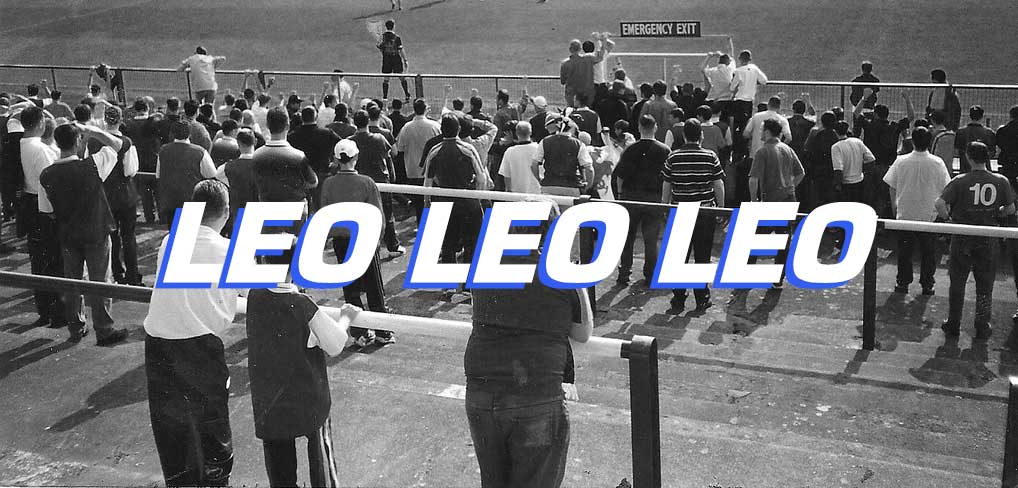He’s somewhat of a cult hero in Cardiff, but what exactly does Leo Fortune-West remember of his time in South Wales, his partnership with Robert Earnshaw and infamous owner Sam Hammam.
Scott Johnson caught up with the big man himself in an exclusive View From The Ninian interview.
I assume you already know you are one of the great Cardiff cult heroes. What sort of a response do you get when you come in to contact with Cardiff supporters? Do you also get this at other clubs?
I am well remembered in Cardiff. I always think if you’re fortunate enough to have won a promotion with a club, you become part of the club’s history. It’s the same with other clubs I have gained promotion with, however not to the same extent. Cardiff is not only a city, but a capital city.
http://gty.im/1366342
When I think of your time at Cardiff, I think of you and Robert Earnshaw up front. You were like his bodyguard. What was your relationship like, on and off the pitch, and what is it like playing alongside someone who was clearly destined for greater things?
I’ve said this before but I think Earnie is by far the best and most composed finisher I’d played with. What I’ve also said about Earnie in the past is that perhaps his size and weight hindered a longer career in the Premier League. I remember watching Defoe play as a youth, then professionally and I think ability-wise, the two were matched.
http://gty.im/1122365
You were at Cardiff during a period when they began their ascent up the divisions. What was it like being at the club during the Sam Hammam era? I guess it was the beginning of the end for your time at the club, as you departed when Cardiff earned promotion to the second tier.
The club was definitely on the rise and I’d like to think that where the club now is in part due to the players who came before. The club did change rapidly under Hammam’s influence and when I came for a club record of £300k, a year later that was closer to £2M.
http://gty.im/1676627
I’m sure I heard somewhere that you recently attended a Cardiff game with your son. Is that right and if so, which game and how was it?
Yes, that’s right. I work in Sheffield and when the Bluebirds played Sheffield United, I came to watch with my 15 year old son. If felt good being immersed amongst the Cardiff fans. I think it took a second before I was recognised. Not the low profile I was looking for! The game in itself wasn’t exactly end to end, but I think at that stage of the season, it’s about fighting for points.
http://gty.im/1186540
You played for something like 22 clubs by the end of your career. The old cliché is of former players keeping an eye out for the results of their former clubs. Which of your former clubs do you remember with affection and are there any that you don’t hold any affection for?
22 clubs! I’ve never counted. I came up through non-league and I finished in non-league. I think the clubs I gained promotion with are very special to me. I also know that becoming professional from non-league is very hard. I do think back with some regret because I turned professional at 24 and I think I was good enough at 19 or 20. Four years in a long time in professional football.
http://gty.im/1557395
You gave up a university course to become a professional footballer. What course were you undertaking and did you ever return to your studies?
I started a degree course at the University of Greenwich studying Urban Studies. After the 1st year, I was given the opportunity to become a professional. After very careful consideration of about a second, I decided to give up the course! I returned to studies many years later and completed a degree in Social Sciences and the course was very enjoyable. I think football is something you have to grab with both hands. Looking at it now at the age of 47, I think when you finish playing and have to return to normal work, it’s very much starting again and that has its disadvantages. There are not enough jobs in football for every footballer that retires. Being a footballer has given me some many priceless experiences and these experiences will last a lifetime.
You were briefly a manager at Armthorpe Welfare FC. How did you find it? What was Leo Fortune-West the manager like?
I’ve never bought into what makes a good manager and what doesn’t. From all the managers I have played under, there were things that I would do and things that I wouldn’t do. I think ultimately what makes a good manager is good players. It wasn’t easy at Armthorpe because there was no money, therefore getting players to commit was difficult, especially when they could earn overtime or couldn’t take half days to travel to far away games midweek. At a lower level, understandably it not as professional in terms of how it’s run and there’s only so much you can go over and above.
Finally what are you up to now? Did football set you up financially? Are you still involved in football, or do you have a job unrelated to the game?
I currently work for Adult Social Services and in the main, assess older people to ensure they can manage at home. Financially, you spend what you earn in relation. I think footballers get a bad rap for the lifestyle they lead, but it’s important to remember if the pay for say police, nurses and other trades was the same, they would also be doing the same things. It’s just a case of being young and carefree.
